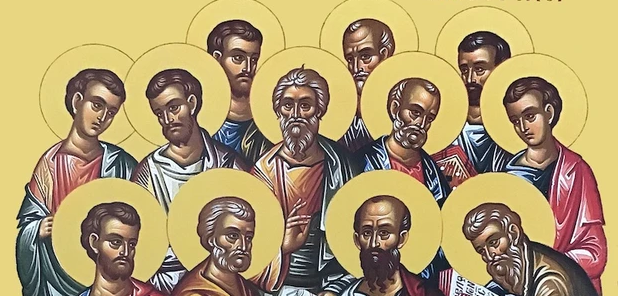Fifteenth Sunday in Ordinary Time
Sunday, July 11, 2021
You are disciples. You are prophets. You’ve been summoned; you’ve been empowered; you’ve been sent. For the past few Sundays, we’ve been talking about God’s power—his δυναμις (dynamis). When the gospels spoke of Jesus performing miracles, they used the Greek phrase “doing powerful deeds.” And that is what each of us has been called to do.
Let’s talk about what it means to be a prophet. The name “prophet” comes from two Greek words, προ (pro) meaning ‘for’ and φαινω (phainō) meaning ‘to bring to light’ or ‘disclose.’ The prophet discloses what God reveals. As Amos points out to Amaziah, the priest at Bethel, in the first reading this morning, the prophet is summoned by God—willing or not. Jesus summoned the Twelve in today’s gospel. This summons is not only just for the Twelve, but it echoes down through the ages to all of Jesus’s disciples: “Come, follow me.” This call was given us long ago. For us who have received it—for all prophets—the summons is not optional. It is who each of us is called to be.
The prophet is given authority. Prophets have neither power nor authority on their own. It must be given to them. In today’s second reading, Saint Paul writes, “In him we were also chosen, destined in accord with the purpose of the One who accomplishes all things according to the intention of his will…” Prophets exercise the authority that comes from the power—the δυναμις (dynamis)—they have been given. They “do powerful deeds.” So, to disciples—his prophets—the ones who are to bring to light the good news— Jesus gives authority over unclean spirits. The gospel goes on to tell us that “they drove out many demons and they anointed with oil many who were sick and cured them.” Throughout history, illness has been understood as the presence of the power of evil. Our word for sickness—malady—comes from the French mal meaning ‘evil.’ In French, “I’m sick” is rendered “J’ai mal”—literally, “I have evil.” So, the disciples are given authority—literally power—over evil.
What power does evil have? Please understand that the so-called “power of evil” is nothing at all like the power of God. Evil is pure negativity. It’s a lack, not a presence. It’s the power of entropy, of decay, of dissolution, of destruction. Do you know why modern swimming pools have two drains at the bottom? It’s to prevent people from being sucked into the drain and drowning. It used to happen. The suction from a single drain is so powerful that it’s hard or impossible to escape from it. But is it the suction that has the power to pull you in? Isn’t it the weight of the water in the pool trying to escape that pushes you into the drain? That is what the so-called “power” of evil is like. Evil is a vacuum that demands to be filled.
The disciple-prophets are endowed by Jesus with the power of positivity. Their message to repent—literally to “change your mind”—is an invitation to turn from negativity to positivity. The disciples don’t fight negativity with negativity; rather, they bring the positivity of the Spirit, which renders the negativity powerless. It’s that negativity that’s the demon that possesses so many people. It’s that negativity that’s behind the soul-sickness of the ages. The disciples—the prophets—are empowered to drive out those demons and cure that sickness. And so are you. You’re empowered to bring the peace, the love, the caring, the understanding, the forgiveness, the life-giving Spirit to all those in fear, emptiness, sorrow, and despair.
There’s a third characteristic of a prophet. A prophet is one who is sent. Jesus sent his disciples out two-by-two. We, too, are sent. That doesn’t necessarily mean that we’ve been called to be religious preachers, teachers, or healers. Very few people have the prophetic mission to proselytize. I’m not even sure if that’s such a good idea these days at all. We can discern our mission by discovering whom we’re being sent to. Aren’t we sent to bring God’s power—his δυναμις (dynamis)—to everyone we encounter? Don’t we all struggle against negativity? We bring the gospel—the good news—to others every time we bring acceptance, kindness, compassion, understanding, and forgiveness. We are prophets every time we choose another’s well-being over our own comfort and self-centered wants. There is no ego in the prophetic message.
We are summoned, empowered, and sent. That’s our prophetic mission. Unlike Amos and the prophets of old, we never have to go it alone. Jesus sent his disciples out two-by-two. God always provides us with the companionship and support we need to carry on. We are, after all, prophets sent to other prophets. As Jesus said, “Where two or three are gathered in my name, there am I in their midst.” We are a community in communion with one another through the power of the Spirit. We pray together. We share in the eucharist together. And so, we fulfill our prophetic mission together, yesterday, today, and forever.
